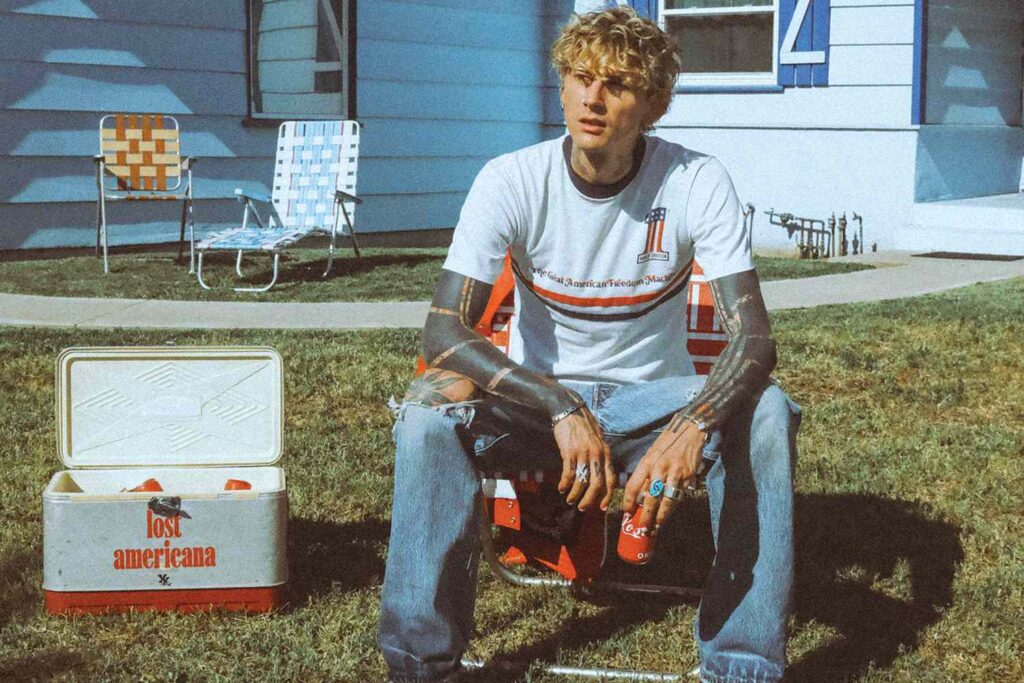NEED TO KNOW
MGK — the artist born Colson Baker and formerly known as Machine Gun Kelly — is discussing his new album Lost Americana when a couple from his hometown approach him in the lobby of his N.Y.C. hotel.
“Dude, Cleveland is like Fight Club; there’s an if-you-know-you-know aspect to it,” the Grammy-nominated singer-songwriter, 35, says as the pair walk away. “It’s like a major respect thing that we all have for each other.”
Since launching his music career nearly 20 years ago, MGK has gone from hometown hero to one of rap and rock’s most electrifying acts, amassing a passionate fandom (and more than 9 million Instagram followers).
Debra L Rothenberg/WireImage
There are detractors, too, criticizing his vulnerable lyrics and genre melding, but MGK has learned to shrug them off: “I became so hated for, what has become apparent to me, no reason . . . just because I artistically express myself, through fashion, music, whatever — because I choose to not stay contained into a societal box.”
Indeed, the rapper-turned-punk rocker has learned to tune out the noise as he prepares to release Lost Americana on Friday, Aug. 8.
Take PEOPLE with you! Subscribe to PEOPLE magazine to get the latest details on celebrity news, exclusive royal updates, how-it-happened true crime stories and more — right to your mailbox.
“The hate for me has become so pop culture that it’s almost like that’s automatically what you say to fit in,” the “Cliché” singer — whose annual charity MGK Day event will take place in Cleveland Aug. 8-10 — says. “That s— doesn’t even mean anything to me. I’ve let it go completely to where I’m like, ‘Oh, that’s a joke.’ I’ve realized they’re the conformists — you don’t even hate me for a reason that you can actually think of because all I do is entertain, and entertainment can’t be that serious.”
MGK notes that “the girls or the gays that come to watch the show — or that tune in to listen — they wear their fandom on their chest,” but that most of the hate he receives seems to come from men, who are projecting.
“I think people just don’t like that I do whatever the f— I want, and it’s a reflection of them not being able to do whatever they want,” he adds. “I think men let their insecurity rule their entirety. I think to them, they’re like, ‘He’s supposed to be like this, because this is this carnal, archaic way of what men are…’ I’m like, look, we can be protectors, and all these other things that we’re supposed to be, and also be expressive and vulnerable and emotional, and we can dress how we want, look how we want.”
MGK unleashes that spirit on Lost Americana, his seventh and most ambitious LP. On the
nostalgia-tinged album, out now, he blends pop, punk and hip-hop while trying to make sense of love, loss and fame. (His tabloid-fueling on-and-off romance with actress Megan Fox, 39, with whom he welcomed a daughter in March, may or may not be an inspiration.)
Intercope Records
“Maybe this time,” he says of his haters, “they’ll get to know the man-slash-broken-boy behind the moniker MGK.”
The record has a mix of feel-good anthems, as well as moodier tracks that cover weightier subject matter — and MGK had no hesitations wearing his heart on his tattooed sleeve once again this era.
“Vulnerability is how I was able to hold on to the fan base I’ve had for so many years,” he says. “The human behind the music has to show the human side.”
For more on MGK, pick up the new issue of PEOPLE, on newsstands everywhere Friday.

